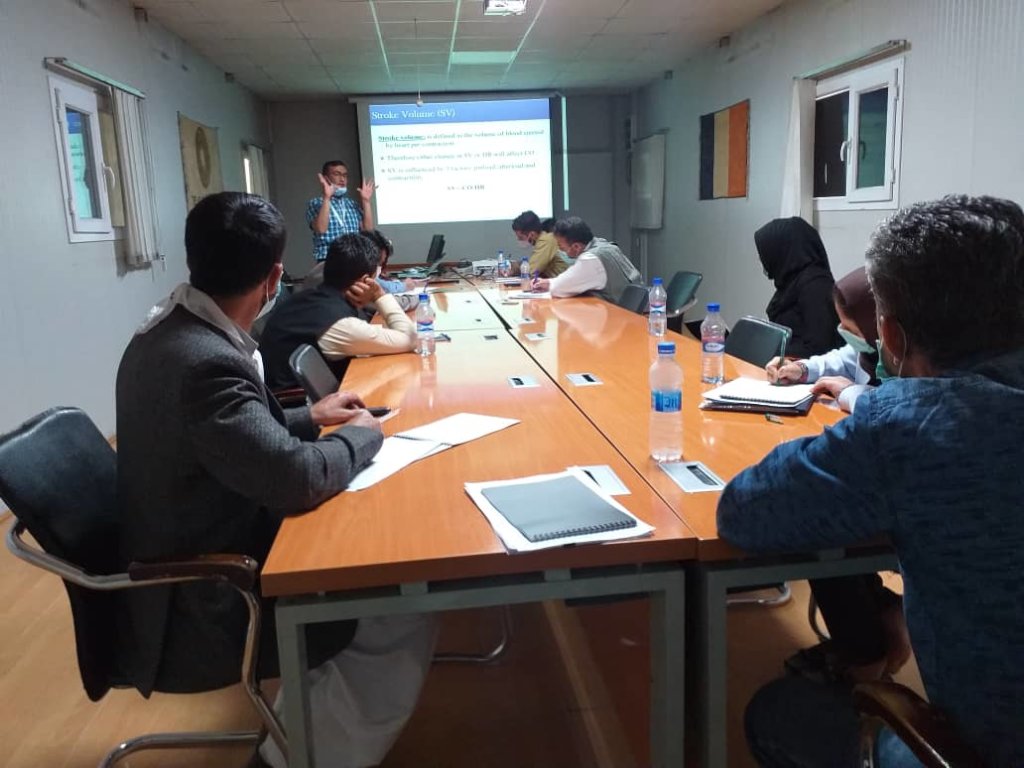By Aziz Ahmad Jan | Chief Executive Officer
As part of its covid-19 response FMIC has been closely working with the Ministry of Public Health (MoPH) and other partner organizations to train frontline healthcare workers in infection prevention and control, and clinical knowledge and practice. FMIC also collaborated with MoPH and WHO-Afghanistan in performing free PCR based Covid-91 tests for samples referred by MoPH. For the hospital team; patients, visitors and communities at large, FMIC developed a range of resources including posters, audio-visual aids, SMSs and social media posts in local languages to raise awareness about the pandemic and precautionary measures to flatten the curve.
We are encountering unprecedented situations in the face of the Covid-19 pandemic. In the context of Afghanistan, the circumstances are even more challenging due to four decades of continuous conflict, unrest and uncertainties. Healthcare system in Afghanistan is highly fragile and its capacity to deal with a pandemic of this scale is very limited. When it comes to tertiary healthcare, the challenges are even bigger and more daunting. For the last fourteen years, FMIC stands as a ray of hope and safe haven for patients coming from different provinces of Afghanistan. Due to the lockdown situations in the last few months, a number of patients have found it hard to access the hospital; yet in a desperate situation FMIC remains a hospital of choice owing to its state of art technology, highly qualified doctors and dedicated healthcare professionals.
Despite many challenges, FMIC has achieved remarkable success over the past 14 years. In 2009, it became the first hospital in Afghanistan to be ISO certified whereas the first open heart surgery was performed by indigenous doctors at FMIC in 2010. Since 2011 it has annually sponsored an international scientific conference as well as a quality and patient safety convention, both of which showcase Afghan health professionals’ high capacity for critical thinking. The Post Graduate Medical Education Program (PGME) is a flagship program of FMIC established in 2012, with the support of the Aga Khan University (AKU) and Ministry of Public Health (MoPH). The programme has so far graduated 57 physician specialists whereas 25 are currently enrolled in three to five-year programmes in eight disciplines. Five of those programmes – such as anaesthesiology, cardiac surgery, cardiology, pathology and radiology – are not offered anywhere else in Afghanistan. Moreover, healthcare access to patients in remotest areas for tele-consultation and training of human resources has been ensured through eHealth program since 2007.
FMIC has so far served over 1.39 million patients from all parts of Afghanistan through its in-patient and out-patient services. In diagnostics, 4.1 million Laboratory Tests and 0.73 Million Radiology Procedures have been performed thus far. FMIC’s Patient Welfare Programme underwrites the cost of care for people who cannot afford to pay for all or part of their treatment. During the year 2019 alone, 42,598 patients were supported through patient welfare program with a financial contribution of US$ 2.3M by FMIC. Since FMIC’s inception in 2006 to date FMIC’s Patient Welfare Program has spent over $39 million so far in providing the medical and surgical care to those in critical need.
We are highly grateful to the generosity of our donors for their support to the patient welfare which ultimately helps us serve the most deserving and deprived segments of the society.
Envision a child or mother suffering from life-threatening diseases in an impoverished and war-affected zone. Imagine that just a few dollars contributed by you can help save lives and improve quality of life for many. For example, $10 will pay for an initial visit to a doctor, $15 will pay for one-night stay of a patient in general ward, $65 will pay for one night stay of a patient in the Intensive Care Unit. We do appreciate your continued support and cooperation!
Links:
Project reports on GlobalGiving are posted directly to globalgiving.org by Project Leaders as they are completed, generally every 3-4 months. To protect the integrity of these documents, GlobalGiving does not alter them; therefore you may find some language or formatting issues.
If you donate to this project or have donated to this project, you can recieve an email when this project posts a report. You can also subscribe for reports without donating.
